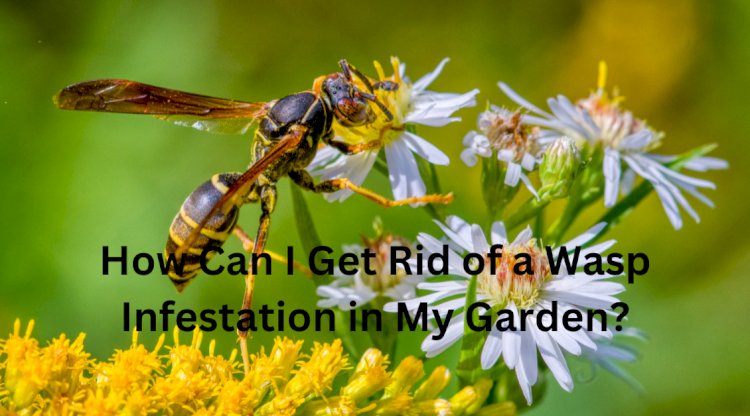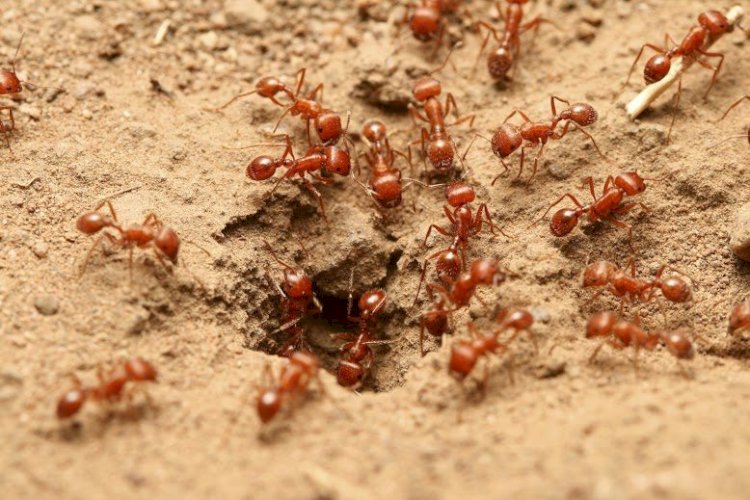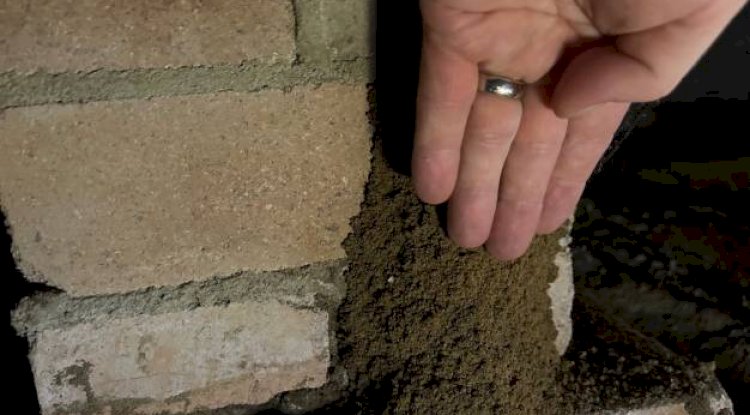How Can I Get Rid of a Wasp Infestation in My Garden?
To get rid of a wasp infestation in your garden, you can use diy methods such as installing traps or spraying a mixture of soap and water directly on the nests. These methods help eliminate the wasps and prevent them from returning.

Discover top-notch pest control services to safeguard your garden oasis from troublesome wasp infestations. Whether you're establishing a new garden or nurturing an existing one, ensuring a serene and safe environment is paramount. Wasp nests can swiftly turn your gardening joy into a nightmare, posing risks to both you and the tranquility of your outdoor haven.
To combat these unwelcome visitors and regain control of your garden, we present simple yet highly effective methods for eradicating wasp infestations. Don't let wasps disrupt your outdoor bliss; opt for professional pest control services to reclaim your peaceful garden sanctuary.
Understanding The Wasp Behavior In Your Garden
Recognizing The Signs Of A Wasp Infestation
If you're spending time in your garden and notice an increasing number of wasps, it's crucial to recognize the signs of a potential infestation. Here are some indicators that you might have a wasp problem:
- Frequent wasp sightings: If you consistently see wasps buzzing around in your garden, it is a clear indication of an infestation.
- Wasp nests: Discovering a nest in or around your garden is a strong sign that you have a wasp infestation. Nests are often found hanging from tree branches, eaves, or hidden in shrubs.
- Increased wasp activity: Noticing more wasps than usual, especially during the warmer months, could be a sign of an infestation. They may be more aggressive and territorial than solitary wasps.
Identifying The Different Types Of Wasps In Your Garden
To effectively address a wasp infestation, it's important to identify the different types of wasps in your garden. Understanding their characteristics can help you devise appropriate control measures. Here are a few common types of wasps you might encounter:
- Paper wasps: They are usually brown in color and have slender bodies with long legs. Paper wasps build open, umbrella-shaped nests, often found under eaves, in garages, or high on bushes.
- Yellow jackets: Identified by their black and yellow markings, yellow jackets are aggressive and build nests in enclosed spaces such as wall voids or underground burrows.
- Mud daubers: These wasps construct their nests out of mud and have a long, slender body. Mud daubers are generally solitary and are not as aggressive as other wasp species.
- Bald-faced hornets: Although they are referred to as hornets, these insects are actually a type of wasp. They have black bodies with white markings and build large aerial nests. Bald-faced hornets are highly defensive and can be aggressive when their nests are threatened.
Understanding The Risks Associated With A Wasp Infestation
While wasps play a vital role in the ecosystem as pollinators, a wasp infestation in your garden can pose risks to you, your family, and your pets. Here are some of the potential risks associated with a wasp infestation:
- Stings: Wasps can sting multiple times, causing intense pain and potentially triggering allergic reactions in sensitive individuals.
- Aggression: When a wasp nest feels threatened, the insects can become highly aggressive and defend their territory. This puts anyone nearby at risk of getting stung, even if they unintentionally disturb the nest.
- Damage to plants and fruits: Some wasp species, like yellow jackets, feed on plant sap and fruits. They may damage your garden and spoil your harvest.
- Interference with outdoor activities: A large number of wasps can make it difficult to enjoy your garden or engage in outdoor activities, creating an unpleasant atmosphere.
Being aware of these risks can help you take necessary precautions and address a wasp infestation promptly and effectively. Remember, it's essential to prioritize your safety and the well-being of your garden.
Creating A Wasp-Friendly Garden
Wasp infestations can be a nuisance in your garden, but instead of trying to get rid of them entirely, why not create a wasp-friendly garden? By incorporating certain plants, implementing proper maintenance techniques, and using natural deterrents, you can discourage wasps from nesting in your garden and create a more harmonious environment.
Here are some key points to consider:
Choosing Wasp-Repelling Plants For Your Garden
- Certain plants possess natural scents and properties that repel wasps. By incorporating these plants into your garden, you can discourage them from nesting in the vicinity.
- Some popular wasp-repelling plants include mint, eucalyptus, thyme, basil, marigolds, and citronella. Consider planting these in different areas of your garden to maximize their effectiveness.
- These plants not only repel wasps, but they also attract other beneficial insects like bees and butterflies, enhancing the overall biodiversity of your garden.
Implementing Proper Garden Maintenance Techniques
- Keeping your garden tidy and well-maintained can prevent wasps from finding suitable nesting spots.
- Regularly trim and prune your plants to avoid overgrowth, as dense vegetation can attract wasps seeking shelter.
- Remove fallen fruits, food scraps, and garbage promptly, as these can attract wasps in search of food sources.
- Seal any potential entry points in buildings or structures near your garden, as wasps may use these as nesting sites.
Using Natural Deterrents To Discourage Wasps From Nesting In Your Garden
- There are several natural deterrents you can use to discourage wasps from building nests in your garden.
- Hang fake wasp nests or paper bags in strategic locations, as wasps are territorial creatures and tend to avoid areas already occupied.
- Create homemade wasp repellent sprays using ingredients like vinegar, essential oils, or dish soap. These can be sprayed around your garden to deter wasps.
- Consider using decoy insects, like fake wasp or hornet replicas, to intimidate and deter real wasps from nesting in your garden.
By creating a wasp-friendly garden, you can strike a balance between managing the presence of wasps and maintaining a beautiful outdoor space. Remember to choose wasp-repelling plants, implement proper garden maintenance techniques, and use natural deterrents to discourage wasps from nesting.
With these strategies in place, you can enjoy a garden that is vibrant, diverse, and free from excessive wasp infestations.
Safe And Effective Wasp Removal Methods
Wasps can be a common and unwelcome presence in our gardens, posing a threat to both our safety and enjoyment of outdoor spaces. Thankfully, there are several safe and effective methods for removing wasp infestations. Whether you prefer do-it-yourself solutions or seek professional assistance, here are some options to consider:
Diy Solutions For Removing Wasp Nests
- Locating the wasp nest is the first step to effectively remove it. Look for it in areas such as eaves, bushes, or trees.
- Wait until dusk or early morning when most wasps are inside the nest and less active.
- Wear protective clothing such as long sleeves, pants, gloves, and a hat to reduce the risk of stings.
- Using a long-distance wasp spray, carefully aim at the nest from a safe distance to avoid being stung.
- After spraying, observe the nest to ensure no activity for a few days before removing it.
Creating Homemade Wasp Traps
- Use a plastic bottle or jar to make a simple and effective wasp trap.
- Cut the top of the bottle, around one-third from the top, and invert it so that it fits into the bottom part of the bottle like a funnel.
- Fill the bottle with sugary or sweet bait, such as fruit juice or soda, and hang it near the area of wasp activity.
- Wasps will be attracted to the bait and enter the trap but will struggle to find their way out, eventually becoming trapped.
Utilizing Soapy Water Spray For Temporary Relief
- Mix a solution of dish soap and water in a spray bottle.
- Wait until evening when wasps are less active.
- Aim the spray directly at the wasps, focusing on the nest entrance if possible.
- The soapy water will coat the wasp's body and wings, preventing them from flying and eventually leading to their demise.
Using A Vacuum To Remove Wasps Safely
- Attach a long tube or nozzle extension to your vacuum cleaner.
- Approach the nest carefully, ensuring you are wearing protective clothing.
- Use the vacuum to suck up the wasps, nest, and any surrounding debris.
- Immediately seal the vacuum bag or dispose of the contents in a sealed bag to prevent any wasps from escaping.
Professional Pest Control Options For Severe Infestations
- If you have a severe wasp infestation or prefer expert assistance, it's advisable to hire a professional pest control service.
- Professionals have the knowledge, experience, and specialized equipment to safely and effectively remove wasp nests.
- They can also provide ongoing prevention measures to ensure your garden remains wasp-free in the long term.
Understanding The Benefits Of Hiring A Pest Control Service
- Pest control services have access to professional-grade products that may not be available to the general public.
- Their expertise helps to identify the type of wasp and the most appropriate treatment method.
- Pest control professionals can ensure the safe removal of the nest without causing further harm to you, your family, or the environment.
Choosing The Right Professional For Your Specific Needs
- When selecting a pest control service, consider their qualifications, certifications, and experience in handling wasp infestations.
- It is essential to choose a company that uses eco-friendly and humane methods whenever possible.
- Read reviews and ask for recommendations from friends or neighbors to find a reputable and trustworthy professional.
Exploring Eco-Friendly Pest Control Methods
- If you prefer eco-friendly solutions, there are pest control companies that specialize in environmentally conscious methods.
- These methods may include using natural repellents, essential oils, or organic products that are safe for humans, pets, and the ecosystem.
- Eco-friendly pest control focuses on minimizing harm to non-target species and reducing the use of harmful chemicals.
With these safe and effective wasp removal methods at your disposal, you can say goodbye to your garden's unwanted visitors. Choose the approach that best suits your comfort level, and soon, your garden will be free from wasp infestation. Remember to prioritize safety and, when in doubt, consult a professional pest control service for expert assistance.
Preventing Future Wasp Infestations
When it comes to pest control Dhaka, wasps can become a significant nuisance in your garden. However, there are effective measures you can take to prevent future infestations. By implementing a few simple steps, you can minimize the chances of wasps establishing their nests in your garden. Here are some valuable methods for preventing future wasp infestations in Dhaka:
Sealing Potential Entry Points In Your Garden
- Inspect your garden for any openings, cracks, or gaps in structures such as walls, fences, and sheds. Seal these entry points using caulk or weather stripping to prevent wasps from entering.
- Ensure that windows and doors are properly fitted, with no gaps that could allow wasps to sneak in. Use screens or mesh to cover any openings.
- Check for any holes in tree trunks or branches that could serve as nesting spots. Fill these holes with expanding foam or a wood filler to eliminate potential nesting places.
Regularly Inspecting Your Garden For Wasp Activity
- Keep an eye out for any signs of wasp activity in your garden. Look for aerial nests attached to eaves, tree branches, or other suitable locations. If you spot a nest, take action to remove it or seek professional assistance.
- Monitor areas around flowering plants and fruit trees, as they can attract wasps. Reduce the attractiveness by picking up fallen fruit and keeping the area clean to discourage their presence.
- Regularly check your outdoor furniture, barbecue grills, and other equipment for any hidden wasp nests. Wasps may find these areas ideal for nesting due to their sheltered nature.
Maintaining Proper Waste Management And Cleanliness In Your Garden
- Dispose of garbage and food waste properly in sealed containers. Wasps are attracted to these food sources, so by eliminating them, you make your garden less appealing to wasps.
- Clean up spills and food debris promptly, especially when hosting outdoor gatherings or picnics. Wasps are attracted to sugary substances, so ensure a thorough clean-up after any sweet treats.
- Maintain a tidy garden by regularly removing fallen leaves, rotting fruit, and decaying organic matter. These provide ideal spots for wasps to build nests and establish their colonies.
When it comes to pest control service for your garden, remember that prevention is the ultimate priority in dealing with wasp infestations. By focusing on sealing potential entry points, conducting regular inspections for wasp activity, and upholding proper waste management and cleanliness, you can significantly diminish the likelihood of attracting these buzzing insects to your outdoor space. Our pest control service is dedicated to helping you safeguard your garden from wasp infestations through effective preventive measures and expert guidance.
Stay proactive, and enjoy your garden without the annoyance of wasp intruders.
Conclusion
Getting rid of a wasp infestation in your garden requires a combination of prevention and intervention strategies. By eliminating attractants such as food and water sources, sealing up potential entry points, and removing potential nesting sites, you can reduce the likelihood of a wasp infestation in the first place.
If you do find yourself dealing with a wasp problem, it's important to prioritize safety and enlist professional help if needed. There are various diy methods you can try, such as using vinegar or soap sprays, but these may not always be effective.
In such cases, it's best to rely on professional pest control services to ensure proper removal and to minimize the risk of getting stung. Remember, staying proactive, taking preventive measures, and seeking professional assistance are essential for a wasp-free garden and a safer outdoor environment for you and your family.
Share
What's Your Reaction?
 Like
0
Like
0
 Dislike
0
Dislike
0
 Love
0
Love
0
 Funny
0
Funny
0
 Angry
0
Angry
0
 Sad
0
Sad
0
 Wow
0
Wow
0















